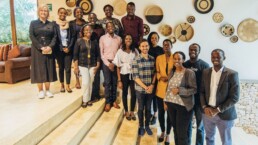Image Credit: Kailend
Malnutrition is the single greatest threat to growth in Africa and to achieving the sustainable development goals by 2030. Africa is the only region in the world where the number of children suffering from stunted growth due to malnutrition is on the rise and now affects up to 59 million children on the continent. If a child is stunted at age 2 they will have a higher risk of poor cognitive and educational achievement in life, with subsequent socio-economic and inter-generational consequences. Popularizing neglected African crops could be the solution to reducing high malnutrition and hunger rates, boosting food security and local economies, strengthening rural development and promoting sustainable land care practices.
To achieve Sustainable Development Goal 2: Zero Hunger and all the other interconnected goals; governments, international agencies, civil society organisations, foundations, businesses and small holder farmers must all work together in a more concerted way to concentrate their efforts on promoting and popularizing the commercialisation, production, processing and consumption of highly versatile, indigenous crops such as; Bambara Bean, Cowpea, Finger Millet, Fonio, Lablab, Marama, Monkey Orange, Moringa, Safou, Sorghum, Kola nut, Amaranth, Boscia Senegalensis and many other crops indigenous to the region that are resistant to drought, low soil fertility and high temperatures.
Bambara bean or the African groundnut is high in protein and soluble fibers, a trait shown to reduce heart disease. Cowpea or Black-eyed pea is drought resistant and thrives in poor soil conditions. Finger millet has the 3rd highest iron content of any grain and can be harvested in 45 days. Fonio, also known as Findi, is Africa’s oldest cereal, is rich in amino acids that are not found in other cereals and can reach full maturity in six to eight weeks. Monkey orange, a wild fruit tree is pest resistant and rich in vitamins B and C and helps to combat soil erosion. Moringa is rich in proteins, iron, magnesium, and vitamins and almost all parts of the tree can be consumed. Safou tree bark produces a resin that makes glue and its leaves are used as a traditional medicine. The Boscia Senegalensis tree’s bark, twigs, leaves and fruits contain natural coagulants and can be used to clarify water sources.
I’ve witnessed, working in the field over the past 4 years on education and skills training programs, how malnutrition can have an overbearingly negative effect on the lives of at-risk youths and low income earning mothers living in impoverished communities in West Africa. A lack of proper nutrition and skills training opportunities from an early onset leaves smaller, poorer communities of socially marginalized people at an unfair disadvantage, with limited opportunities for future growth and personal development. Contributing to creating more delinquents who grow up to be hardened criminals and end up in already overrun prison institutions that do not have the capacity to help reform them. They end up being trapped in a way of life in which they are caught up in a fiercely competitive struggle for minimal income.
Critical reforms to decades old policies and our traditional school systems are long overdue. New agendas should include practical agriculture training and school gardens as a core subject in both public and private school curriculum’s. Only with bold changes and new approaches to past systems that have not worked can we encourage masses of African youths to take up farming seriously, as a lucrative and sustainable future profession, thus serving as the catalyst Africa needs for its new industrious, self reliant age. Pledges and provisions of funding from governments, cooperation’s and international aid bodies are needed to contribute towards equipping and empowering African youths and smallholder women farmers with essential skills in nutrition, biodiversity and agriculture entrepreneurship and all the essential resources they will need to succeed.
Tapping into the immense production and processing potential of our indigenous crops is necessary to ensure the continued growth, health and good condition of our future leaders. Targeted commitments like those made at the Global Nutrition summit in 2017 will contribute towards eradicating acute malnutrition in children and will ensure that Africa’s growing youth population, communities in need and nations reach their full potential. You and I will also need to play our part on the ground in our own communities by getting more involved in volunteering, youth mentorship programs and more active participation in community development initiatives, as soon as possible, for those who need it most.
The views expressed in this article are those of the author alone and not the Future Africa Forum.
The views expressed in this article are those of the author and do not necessarily reflect the views of Future Africa Forum. Future Africa Forum is a pan-African policy think-tank and policy advisory consultancy headquartered in Nairobi, Kenya.


